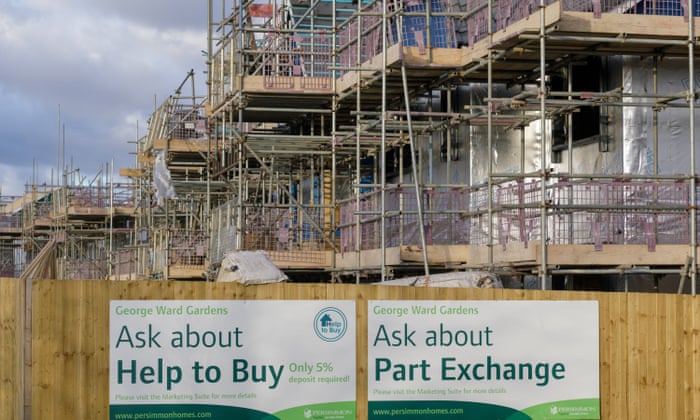Outrage as help-to-buy boosts Persimmon profits to £1bn
Builder condemned for making massive gains from taxpayer-funded programme

Housebuilder Persimmon made a record-breaking £1bn profit last year – equal to more than £66,000 on every one of the homes it sold – with almost half of its house sales made through the taxpayer-funded help-to-buy scheme.
The York-based builder, which sparked widespread public and political outrage for attempting to pay its former chief executive Jeff Fairburn a bonus of £110m, posted pre-tax profits of £1.09bn.
The huge profit – the biggest ever made by a UK housebuilder – means Persimmon banked £66,265 from every one of the 16,449 homes it sold last year. The average selling price was just over £215,000,
The profit from each house it sells has nearly tripled since 2013, when the government introduced the help-to-buy scheme in an attempt to help struggling families buy their first home. Last year the company paid an average of just £31,536 for each plot of land, and spent £112,295 on actually building each home.
Vince Cable, the Liberal Democrat leader, accused Persimmon of “pinching their profits from the public purse”, adding: “Far from benefiting first time buyers, the major effect of help-to-buy is to drive up demand while having no effect on supply. The result is not help for those who need it, but a boost to the profits of big developers.”
Cable demanded that the government immediately end the help-to-buy scheme and take action to crack down on “outrageous” executive pay. “This greed is coming at the expense of the public purse through the subsidies in help-to-buy,” he said. “Help-to-buy is a scam, enriching developers while forcing buyers off the ladder by pushing up prices.”
Greg Beales, the campaign director of the housing charity Shelter, said: “Persimmon represents everything that is wrong with the housebuilding system. The firm has generated huge profits from taxpayer subsidies whilst doing very little to help solve the housing crisis we face.
“Piecemeal schemes such as help-to-buy have made the situation even worse by inflating house prices and giving big developers a leg-up – while doing next to nothing to help those most in need of a genuinely affordable home.”
Many Persimmon customers have complained that their homes are poorly built, with pipes springing leaks and windows cracking just days after they moved in. Persimmon has been awarded only a three-star Home Builders Federation customer service rating every year since 2014, compared with four and five stars for its major rivals.
Victoria Baker, who bought a £380,000 five-bedroom Persimmon house in Ingleby Barwick, near Stockton, last year described the building work on her home as horrific. “We noticed leaks straight away as we were putting things away under the sink; there was a pool of water under the sink in the kitchen,” she said. Baker, who lives in a home built by Charles Church, a brand owned by Persimmon, said numerous other leaks later appeared. She is part of a Facebook group called “Charles Church (Persimmon) Homes From Hell”.
Persimmon has made so much money in recent years that it triggered a near-£500m bonus bonanza for its 150 most senior bosses. The company’s former chair quit when he recognised that the huge bonuses were wrong, but was unable to prevent them being paid out.
Persimmon’s former chief executive Jeff Fairburn was eventually persuaded to give up part of his payout but still walked away with £75m. His replacement, Dave Jenkinson, collected more than £40m.
The company’s huge gains from the help-to-buy scheme, in which the government provides a guaranteed interest-free loan, have sparked a ministerial review. James Brokenshire, the housing minister, is said to be “increasingly concerned by the behaviour of Persimmon”.
A source close to the minister said: “Given that contracts for the 2021 extension to help-to-buy are being reviewed shortly, which overall is a great scheme helping hundreds of thousands of people into home ownership, it would be surprising if Persimmon’s approach wasn’t a point of discussion.”
A government spokesman said officials would “carefully” examine the vast profits made by Persimmon and other housebuilders. “Help-to-buy will look different,” the spokesman said. “We’ve already said it will look only at first-time buyers and we will definitely not be funding leasehold properties. We will look carefully at developer performance over recent years.”
Jenkinson, who was appointed Persimmon’s new chief executive on Tuesday, defended the company’s use of the help-to-buy scheme, saying the company had “helped hundreds of first time buyers” and “given them the opportunity to own their own home”.
He said the help-to-buy scheme was just one element behind the firm’s financial success and the government had not contacted the company with any concern about its use of the help-to-buy scheme.
Jenkinson said his £40m bonanza “isn’t distracting [him] – I’m incredibly focused”. He said his bonus payment was tied up in Persimmon shares, which he had no intention of selling soon. He was not paid a bonus in 2018 and will not receive one in 2019. His basic pay is £518,000.
More than a year ago, Fairburn pledged to set up a charity with a “substantial proportion” of his bonus but has so far failed to do so. He has not registered a charity with the Charity Commission or made any inquiries about how to set one up.
Independent property expert Henry Pryor said: “There is no doubt that help-to-buy has been the crack cocaine of the housing industry. Listen carefully and you can hear the housebuilder bosses chortling into their cornflakes as taxpayers pump up the executive bonus pool.
“With 100,000 kids waking up in B&B accommodation this morning, it’s a national outrage that the government is still pouring accelerant on to the smouldering housing market. Bosses who have trousered the profits from selling to taxpayer-supported buyers have taken the place of bankers on my dart board. They have a business model, thanks to successive governments, that would make Al Capone blush.”

No comments:
Post a Comment